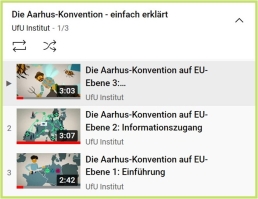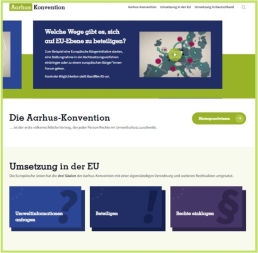UfU Information | Issue 4 – December 2021 | Department of Environmental Law & Participation
Your environmental voice in Europe
How can participation rights and access to justice be strengthened?
Since July 1, 2020, Germany has held the so-called EU Priority Council Presidency together with Portugal and Slovenia. This means that for 18 months, the three Member States took over the Presidency of the Council of the European Union one after the other. Environmental movements had high hopes for this Council Presidency, but above all for the strengthening of participation rights at EU level.
Background
The right to participation is about civil society being able to participate in legislative processes, approval decisions or other policies. This is because political decisions from Brussels sometimes have a major impact on our health or the environment. Proper participation means that citizens and associations can make their voices heard for environmental, climate and nature conservation and that these are also taken into account in political decisions. Otherwise, there is a danger in the political discourse that the concerns of civil society will not be taken into account or will be taken into account too little.
To make participation possible, access to (environmental) information must first be ensured. Because without sufficient access to information, real participation cannot take place.
Another hurdle is the processes in the European Union. These are not very easy to understand, are technocratic and require prior knowledge, which means that the opportunities for participation suffer. Environmental associations have therefore long been calling for the participation rights of civil society to finally be strengthened at EU level.
The Aarhus Convention
This demand by the environmental associations is based primarily on the Aarhus Convention. The European Union signed this international treaty in 1998 and approved it in 2005. The Aarhus Convention enshrines the right to environmental information, involvement in legislative procedures and, not least, access to justice in international law for the first time. The Aarhus Convention, for example, gives the European population the right to take legal action if environmental laws are violated. The convention also emphasizes participation. Civil society must be involved in environmental policy processes and legislative procedures at European level, i.e. it must be informed and have the opportunity to contribute its own ideas effectively.
But an international treaty is not the same as reality. The implementation of the Aarhus Convention is failing on three important points: Access to justice, inclusive digital participation and information deficits.
All information on the Aarhus Convention
YouTube explanatory series: https://bit.ly/3xkgAjz

Aarhus website:
www.aarhus-konvention.de

Access to justice in environmental matters
Access to European courts in the environmental field still has enormous deficits for citizens and environmental associations. The European Union has not only been publicly criticized for this on several occasions, but has also been urged by the United Nations to expand access. This was only partially achieved with the Aarhus Regulation, which was revised in October 2021. The admission requirements for having EU decisions reviewed are still so demanding that only a few civil control procedures can be started at all. The situation looks better for environmental NGOs, but despite this, all legal actions before the European Court of Justice fail due to the admissibility criterion of lack of exclusive concern.
Inclusive digital participation
In addition to access to justice, the Aarhus Convention provides for opportunities for participation. Put simply, there must be hearings and consultations in which citizens and associations can express themselves, raise their objections and contribute their ideas. However, digital participation has so far presented citizens and associations with enormous challenges. The online consultations have so far suffered from a lack of transparency, citizen unfriendliness and technocracy. There is a lack of effective public participation in important fundamental decisions.
Information deficit
Finally, the information deficit is crucial. Many citizens and environmental associations know too little about their opportunities for participation at EU level. As these are complicated legal processes, citizens must be empowered to participate in these processes. This also includes providing sufficient information about the events in Brussels. Unfortunately, the EU institutions are not making sufficient efforts to make these more transparent and easier to understand.
The project
Due to this limited opportunity for participation, UfU launched the EU-AarKo project in 2020. The aim of the project was to promote the rule of law and environmental protection at EU level. On the other hand, the complex European processes and participation rights should be presented in citizen-oriented information materials.
For the first point, so-called workshop discussions were organized in the project (the results can be found on the project page). Participants included civil society, people from EU governments, lawyers and other experts. Improved implementation of the Aarhus Convention was discussed with these parties. It was particularly important for us to involve the governments in these discussions. Access to legal expertise has led to numerous results in these discussions. Probably the most important aspect of this was that citizens can now also initiate internal review procedures for EU decisions as a result of the accompanied amendment to the Aarhus Regulation. Environmental associations and citizens can now also review more diverse environmental decisions, such as European fishing quotas, thanks to the amendment to the regulation.
In order to make the processes at EU level more understandable for civil society, we have worked together on various formats. Among other things, an explanatory video series was created to make participation at EU level understandable. The series is freely available on YouTube. At the same time, digital brochures and a website were developed to make the complex interrelationships in Brussels understandable.
Significance of the project
UfU has long specialized in the field of participation. We consider participation opportunities, especially digital ones, to be indispensable instruments for preventing democratic fatigue, acceptance problems and loss of legitimacy. The more complicated and technocratic political decision-making processes are, the more likely it is that civil society will be lost. The European Union in particular is often perceived as a huge, incomprehensible bureaucratic apparatus. It is therefore important to give citizens access to information and also to the courts and to involve them in EU policies. Only in this way can the EU produce legislation that is close to the citizen.


